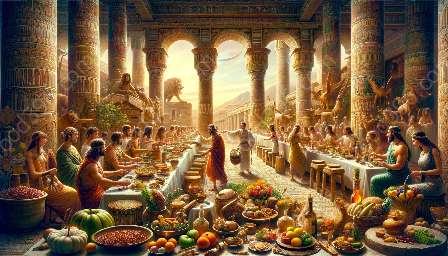The ancient Middle Eastern food cultures are a rich tapestry of culinary traditions, ingredients, and historical significance that have shaped the region's cuisine for millennia. From the fertile crescent to the banks of the Nile, ancient civilizations such as the Sumerians, Babylonians, Egyptians, and Phoenicians have left a lasting legacy on the culinary landscape of the Middle East.
Ancient Roots of Middle Eastern Cuisine
One of the earliest known civilizations in the Middle East, the Sumerians, cultivated a wide variety of grains, legumes, and vegetables, which formed the foundation of their diet. They also developed early techniques for brewing beer and baking bread, laying the groundwork for the region's longstanding love affair with both.
The Babylonians, who followed the Sumerians, contributed greatly to the culinary heritage of the Middle East. They were skilled farmers, cultivating date palms, barley, and sesame, and are credited with the introduction of a wide range of spices and herbs, which added depth and complexity to their cuisine.
Meanwhile, the ancient Egyptians are renowned for their mastery of agriculture and the vast array of ingredients at their disposal. The fertile banks of the Nile provided an abundance of fruits, vegetables, and grains, while the river itself teemed with fish, creating a diverse and varied culinary landscape.
Historical Significance of Middle Eastern Cuisine
The ancient Middle Eastern food cultures are not only noteworthy for their culinary contributions but also for their historical significance. The spice trade, which connected the Middle East with the Mediterranean and beyond, played a pivotal role in shaping the region's cuisine and its influence on global food culture.
Furthermore, ancient Middle Eastern civilizations were at the crossroads of trade routes, facilitating the exchange of culinary techniques and ingredients. The Phoenicians, renowned seafarers and traders, spread the influence of Middle Eastern cuisine throughout the Mediterranean, introducing ingredients such as olives, grapes, and wheat to new territories.
The Legacy of Ancient Middle Eastern Food Culture
Ancient Middle Eastern food cultures have left an indelible mark on the culinary traditions of the region. Many of the dishes and cooking techniques that originated in ancient times continue to be celebrated and enjoyed today.
The use of aromatic spices, such as cumin, coriander, and saffron, can be traced back to ancient civilizations and remains a cornerstone of Middle Eastern cuisine. Similarly, the art of preserving foods, such as pickling and drying, has its roots in the ancient Middle East and continues to be a fundamental aspect of the region's culinary practices.
While the ancient Middle Eastern food cultures have evolved over time, their influence is still palpable in modern-day dishes. From savory stews and kebabs to luscious desserts and fragrant rice pilafs, the culinary heritage of the Middle East reflects the diverse and vibrant tapestry of its ancient food cultures.

